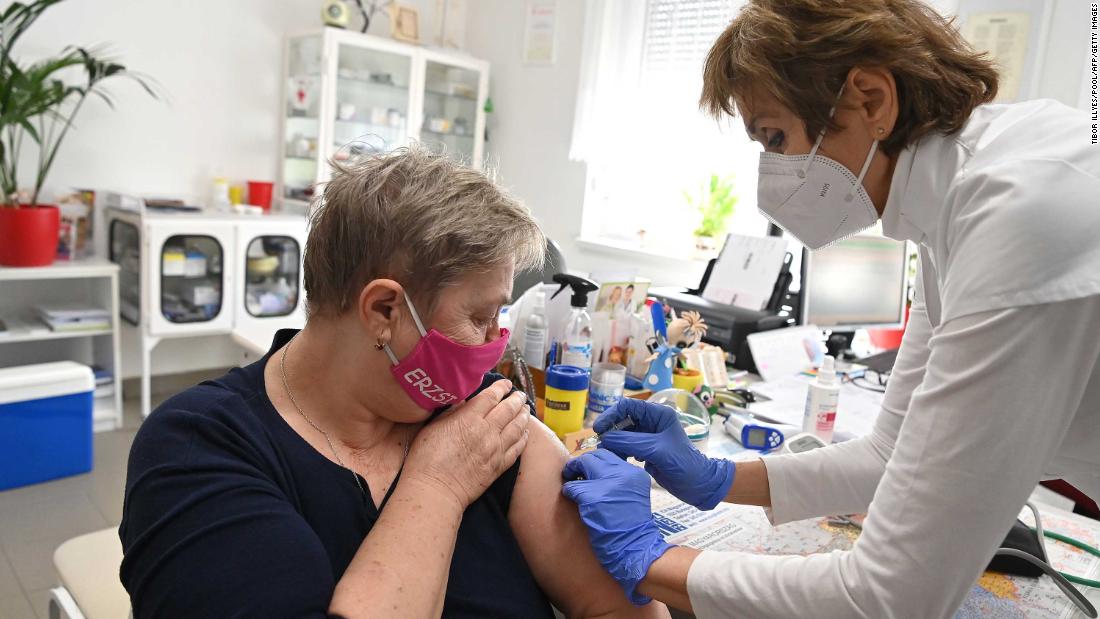Europe’s unified vaccination strategy is splintering
Austrian Chancellor Sebastian Kurz introduced Monday that he intends to work with Israel and Denmark on future vaccine manufacturing and cooperation round growing additional pictures to fight new coronavirus mutations. He will go to Israel with Danish chief Mette Frederiksen on Thursday.
The Austrian chief has been sharply essential of the EU’s vaccine strategy and the bloc’s regulator, the European Medicines Agency (EMA). The EU licensed the Pfizer/BioNTech vaccine in late December 2020, weeks after it had been granted approval within the UK and US.
Brussels has opted for a centralized method to vaccine procurement and distribution however its plan has been hindered by provide and distribution issues. Only 5.5% of the EU’s inhabitants of 447 million has obtained a primary vaccine dose, in response to knowledge from the World Health Organization (WHO).
The EMA has licensed three vaccines — Pfizer/BioNTech, Oxford/AstraZeneca and Moderna — however EU international locations can individually give emergency authorization to different pictures, because the UK did in December, when it was nonetheless within the post-Brexit transition interval.
“The European Medicines Agency is too slow in terms of authorization of pharmaceutical companies,” Kurz mentioned in response to ORF. “That is why we have to prepare for further mutations and should no longer be dependent on the EU when it comes to vaccine production of the second generation.”
Frederiksen, the Danish Prime Minister, made related feedback Monday. “The European vaccine effort can no longer stand alone,” she mentioned, including that this was why Denmark and Austria have been cooperating to acquire extra doses.
Other EU nations have turned to Russia and China to plug the gaps in vaccine provide by way of unilateral procurements. On Monday, Slovakia granted emergency authorization for Moscow’s Sputnik V vaccine, following a delay in provide of the Pfizer and AstraZeneca pictures.
The EMA has not but given the inexperienced mild to the Sputnik V vaccine. “The [Slovakia] approval is based on the results of the clinical trials of Sputnik V in Russia and a comprehensive assessment of the vaccine by experts in Slovakia,” the Russian Direct Investment Fund, which backed Sputnik V’s manufacturing, mentioned Monday.
“We have received numerous requests from EU states to provide Sputnik V directly to them based on the reviews of their national agencies,” Kirill Dmitriev, RDIF CEO mentioned in an announcement. “We will continue to do so as well as work with EMA based on the rolling review procedure we initiated in January.”
Slovakia is the second EU nation to independently grant Sputnik V authorization after Hungary, which started rolling out the vaccine in February. Hungary is additionally the primary EU nation to have rolled out China’s Sinopharm vaccine, which has not been accredited by the EMA.
“Vaccination is not a political issue, it is a matter of effectiveness and reliability,” Hungary’s secretary of state for worldwide communication and relations, Zoltan Kovacs, advised CNN on Monday. “We see that both the Chinese as well as the Russian vaccines are being used around the globe in many places.”
Hungary has additionally ordered doses of the Pfizer, Moderna and AstraZeneca vaccines by way of the EU, however Kovacs mentioned the bloc’s centralized strategy had failed to fulfill expectations. “Well, it’s obvious and visible by now that that strategy compared to say the UK, Israel, even the United States, failed,” he mentioned.
“The Brussels bureaucracy was not able to come up with fast and immediate resolutions regarding the contracts, we are lagging behind at least two months.”
Hungary has lengthy been an outlier in Europe, with its leaders repeatedly clashing with EU chiefs over human rights coverage. But Hungary is removed from the one nation annoyed by the bloc’s dealing with of the vaccine rollout.
Czech Republic President Miloš Zeman indicated to CNN affiliate Prima News on Sunday that his nation might roll out Sputnik V if it is licensed by the home regulator. “I wrote to President Putin requesting the delivery of Sputnik-V. If I am properly informed, this request will be granted, but of course we will need the [medical regulator] certification,” he mentioned.
“If various people warn us against having a Russian or Chinese vaccine, then it is good to tell them that the vaccine has no ideology,” he added.
The fracturing of the EU’s centralized strategy comes amid an evolution throughout the bloc in regards to the AstraZeneca vaccine. France beforehand mentioned it ought to solely be administered in folks below the age of 65, citing a scarcity of scientific knowledge on its efficacy for older folks.
But Paris has now prolonged the higher age restrict to 75. According to Reuters, there at the moment are fears that the federal government’s preliminary essential feedback have led to decrease take up of the shot within the nation.
At a Downing Street press convention on Monday, England’s deputy chief medical officer Jonathan Van-Tam mentioned the information “clearly vindicated” the UK’s resolution to vaccinate all age teams from the start of the rollout course of. “I’m not here to criticize other countries but I do say that I think in time, the data emerging from our program will speak for itself and other countries will doubtless be very interested in it,” he added.
EU leaders at the moment are targeted on getting the bloc’s inoculation marketing campaign again on observe. “Our top priority now is speeding up the production and delivery of vaccines and vaccinations across the European Union,” European Council President Charles Michel mentioned final week.
“It’s why we support the Commission’s efforts to work with industry to identify bottlenecks guarantee supply chains and scale up production. And we want more predictability and transparency to ensure that pharmaceutical companies comply with the commitments,” he added.
The bloc now faces a race to repair the vaccine rollout whereas retaining the religion of jittery member states wanting elsewhere for options.
CNN’s Lindsay Isaac, Antonia Mortensen, Ivana Kottasova, Chloe Adams, Andrew Carey and Stephanie Halasz contributed to this story.




